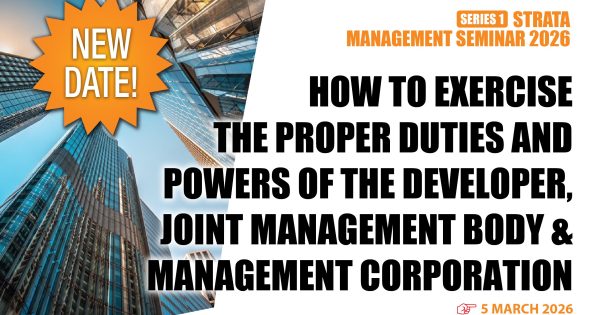PJ Centrestage JMB v
- Cherish Springs Sdn Bhd
- Leadmont Properties Sdn Bhd
- Majlis Bandaraya Petaling Jaya
- Hong Leong Bank Bhd
- Malayan Banking Bhd
Shah Alam High Court Civil Suit No. BA-22C-30-05/2017 (Grounds of Judgment dated 19 February 2024)

Facts:
The Plaintiff is a Joint Management Body (JMB) of a development area known as Centrestage. The 1st Defendant is the developer of Centrestage and the 2nd Defendant is a company who had purchased the properties from the 1st Defendant. The 3rd Defendant is Majlis Bandaraya Petaling Jaya who granted planning permission to the 1st Defendant and approved the building plans of the 1st Defendant. The 4th and 5th Defendants are the banks financed the 2nd Defendant in purchasing the properties.
In this case, the 1st Defendant failed to provide the Plaintiff with the documents which were necessary for the maintenance of the management of the Centrestage. In addition, the 1st Defendant amended building plans and CCC was issued on 24.7.2014. The 1st Defendant further sold parcels which the Plaintiff claimed was originally common property of the Centrestage to the 2nd Defendant. (“Impugned Areas“)
The Impugned Areas include
(a) 342 car park bays (Parcel 1153)
(b) 7 areas in Basement 1 (Accessory Parcels No. A7-A9, A35,A36, A45 and A49)
(c) landscape areas (Accessory Parcel No. A1)
(d) 5 units of administration office at level 5
(e) rooftop at Level 6 (Accessory Parcels No. A899 and A921
(f) rooftop at Level 14 (Accessory Parcels No. A1289 to A1294);
(g) entrance and reception area on retail ground floor (Accessory Parcel No. A64)
(h) five external facade (Accessory Parcels No. A925, A1016, A1152, A1243 and A1295
The Plaintiff then sought several reliefs against the 1st Defendant but primarily a return of those Impugned Areas sold to D2. It also includes an injunction to compel the 1st Defendant to provide all the necessary documents, declarations on the status of the common property of the Centrestage, the orders for the relevant authorities to exclude the Impugned Areas from all the previous dealings made, injunction to prevent all the Defendants from dealing with the Impugned Areas and compelling the 1st Defendant and 2nd Defendant to deliver possession of the Impugned Areas to the Plaintiff, order for the 2nd Defendant to pay all the income and rent collected from the common property to the Plaintiff, and damages.
Issues:
There were several issues raised and among others:
- Is the 1st Defendant required to hand over the documents to the Plaintiff?
- With regard to the Plaintiff’s claim for the Impugned Areas:
- Can the Plaintiff file this action when the Impugned Areas were already acquired by the 1st Defendant before the establishment of the Plaintiff?
- Is MBPJ’s approval required for this proceeding?
- Whether the Impugned Areas claimed by Plaintiff constitutes common property of the Centrestage?
- Are the 1st Defendant’s registered strata titles issued for the Impugned Areas indefeasible?
- If the 2 SPAs are invalid:
- What is the nature of the contracts between 2nd Defendant and 4th & 5th Defendants?
- Are the 2nd Defendant’s assignments void?
- Should the Court order the 2nd Defendant to pay the Plaintiff all the income and/or rent collected by the 2nd Defendant?
- Whether the Court should order an assessment of damages to be paid by the 1st and 2nd Defendants to the Plaintiff?
- whether the Court can order the Registrar of Titles to rectify the strata register so as to exclude the Impugned Areas claimed by the Plaintiff.
Findings of the Court:
- Relying on s 15 Strata Management Act 2013 (SMA 2013), the Court found that it is mandatory for the 1st Defendant to hand over the documents to the Plaintiff. The Court also found that 1st Defendant failed to adduce any evidence to rebut the evidence given from the Plaintiff side. The Court granted a perpetual mandatory injunction to compel the 1st Defendant to hand over the Documents to the Plaintiff.
- With regard to 2(a) above, the Court found that the defence of lack of locus standi on the basis that the Impugned Areas had been acquired by the 1st Defendant prior the establishment of the Plaintiff is hard to accept because that could be abused by the developers to defraud purchasers of parcels in the Centrestage by depriving those purchasers of the Impugned Areas before the establishment of JMBs.
- With regard to 2(b) above, the Court found that there is no such requirement of MBPJ’s approval to proceed with this action.
- With regard to 2(c) above, the Court relied on definition of common property in Building and Common Property (Maintenance and Management Act 2007 (BCPA), found that the Parliament’s intention for the Common Property Definition to have a wide scope of application. Also, a wide ambit of common property definition has been applied in precedents and therefore follows the stare decisis doctrine, the Court is bound to follow the precedent. The Court held the common property claimed by Plaintiff constitutes common property of the Centrestage.
- Regarding 2(d) above, the strata title is indefeasible unless one of the exceptions under s340(1) National Land Code (NLC) applies. The Court found that the act of register the common property of the Centrestage which deprived the right of the purchaser to use the common property, and amend the building plans without purchasers’ knowledge amount to fraud and therefore fall under s340(1)(a) NLC. Further, the Court found that the 1st Defendant contravened s69 Strata Titles Act 1985 (STA 1985) which render the registration of the 1st Defendant’s Registered Strata Titles about the common property “insufficient or void instrument” as contained in s340(2)(b) NLC. As such, the strata title obtained by the 1st Defendant is defeasible.
- The Court referred to s24 Contracts Act 1950 (CA 1950) and found that the 2 SPAs is “forbidden” by the common property definition and building definition under BCPA. Enforcing the 2 SPAs “would defeat” the provision of written law which is the common property definition, building definition, accessory parcel definition under BCPA, and also s69 STA. Therefore, the 2 SPAs are considered void.
- The 4th and 5th Defendants only have an equitable security interest. The equitable security interest is subject to the written law which applies to common property such as common property definition (BCPA), and therefore the equitable security interest (assignment) is void even though they are bona fide financiers.
- The strata register ought to be rectified and give effect to the Plaintiff’s entitlement to the common property of the Centrestage.
- Relying on Ideal Advantage Sdn Bhd v Palm Spring JMB, the Court found that the Plaintiff is entitled to the income or rent collected by the 2nd Defendant.
- The Plaintiff is entitled to damages from 1st and 2nd Defendants in light of the unlawful acquisition of the Impugned Areas by the 1st and 2nd Defendants.
Based on the above reasons, the Court allowed the claim of the Impugned Areas by JMB in which the following, among others was granted:
- Declaration of the Impugned Areas claimed by Plaintiff constitutes the common property of the Centrestage,
- the 2 SPAs and assignments are void
- Order for the Registrar of Title to rectify the strata register.
- Mandatory injunction to compel the 2nd Defendant to deliver possession of the common property to the Plaintiff.
- Injunction to restrain the Defendants from dealing with the common property.
- Order for 2nd Defendant to pay the income/rent received to Plaintiff.
Takeaway
The developer should be made aware that the common property is not private property should not dispose them off as parcels (after amending the necessary plans).
Full Grounds can be downloaded here:


